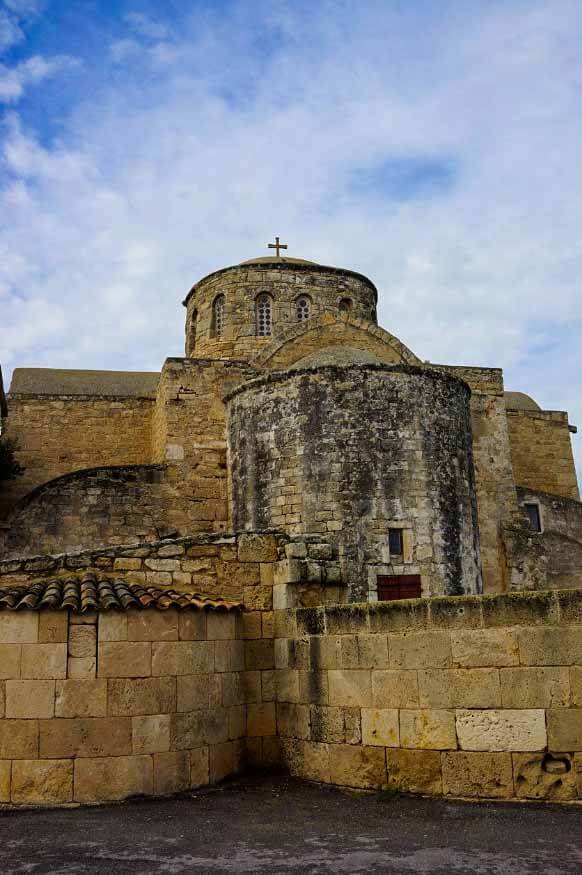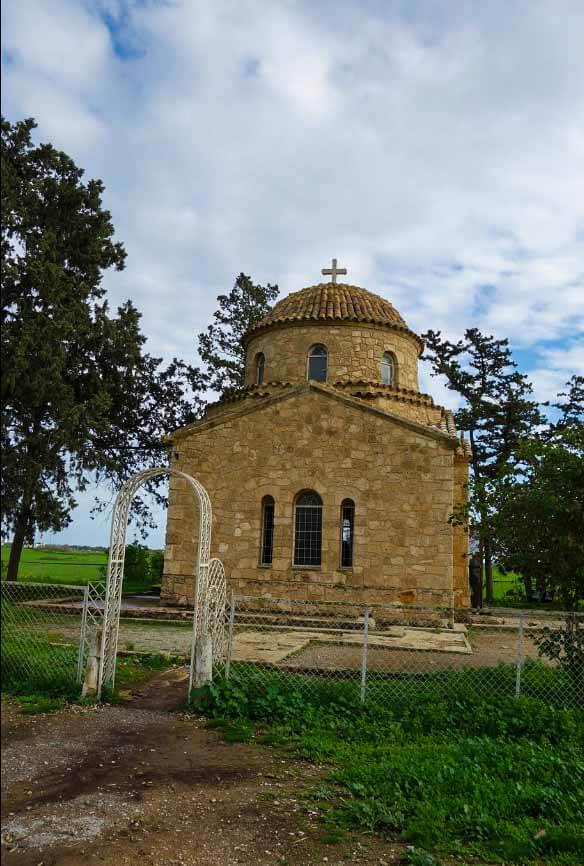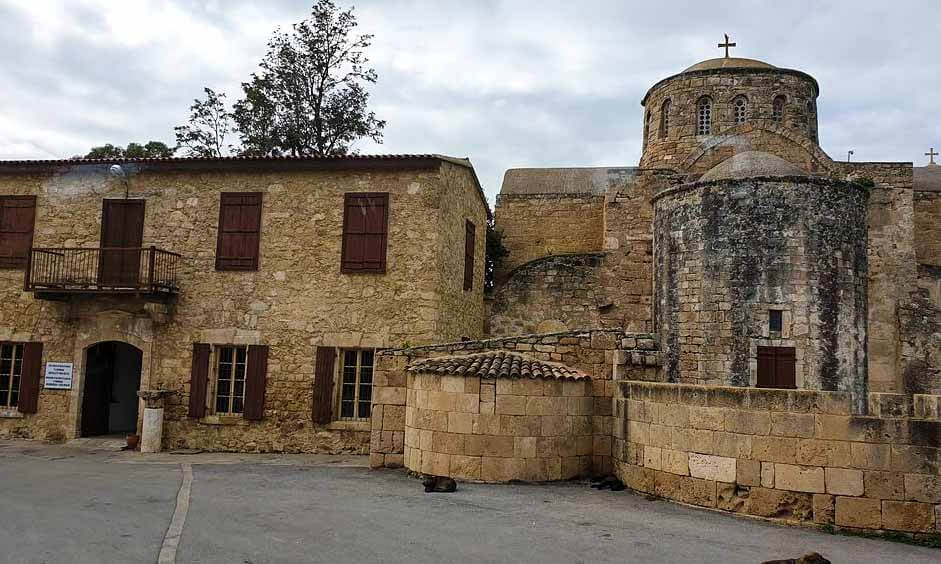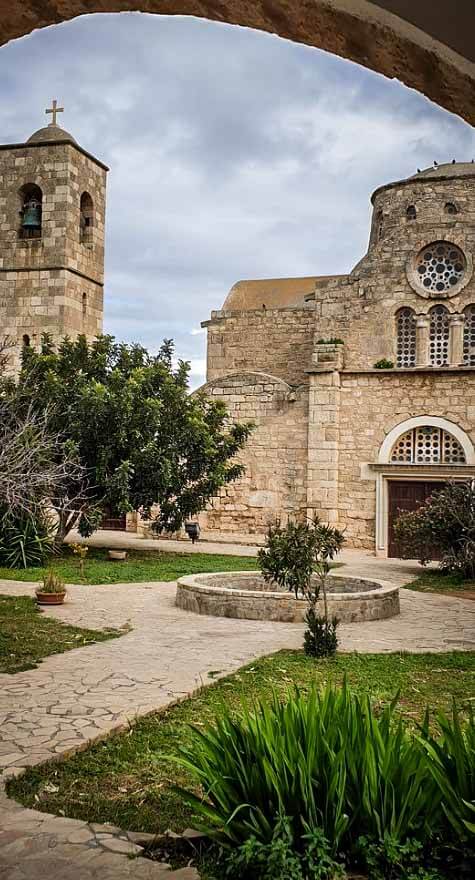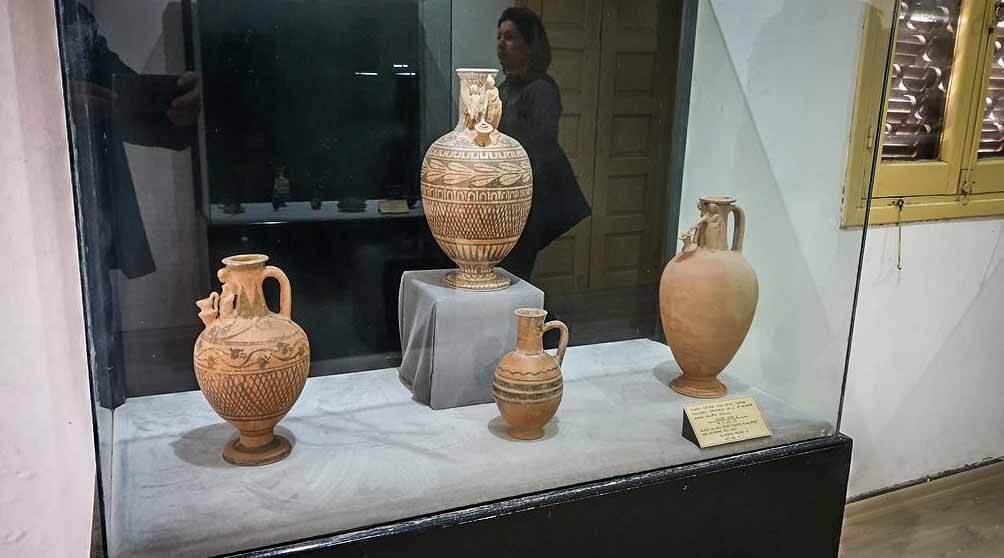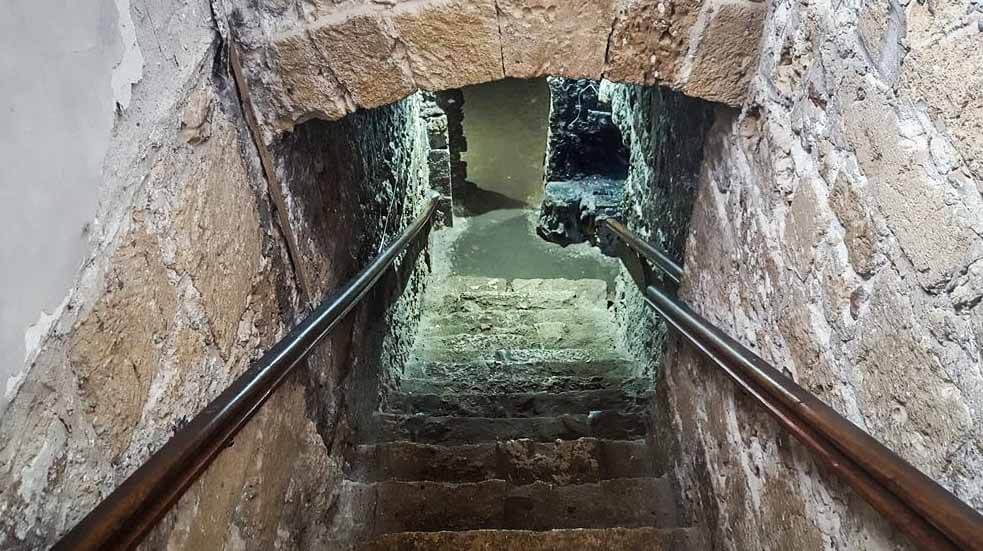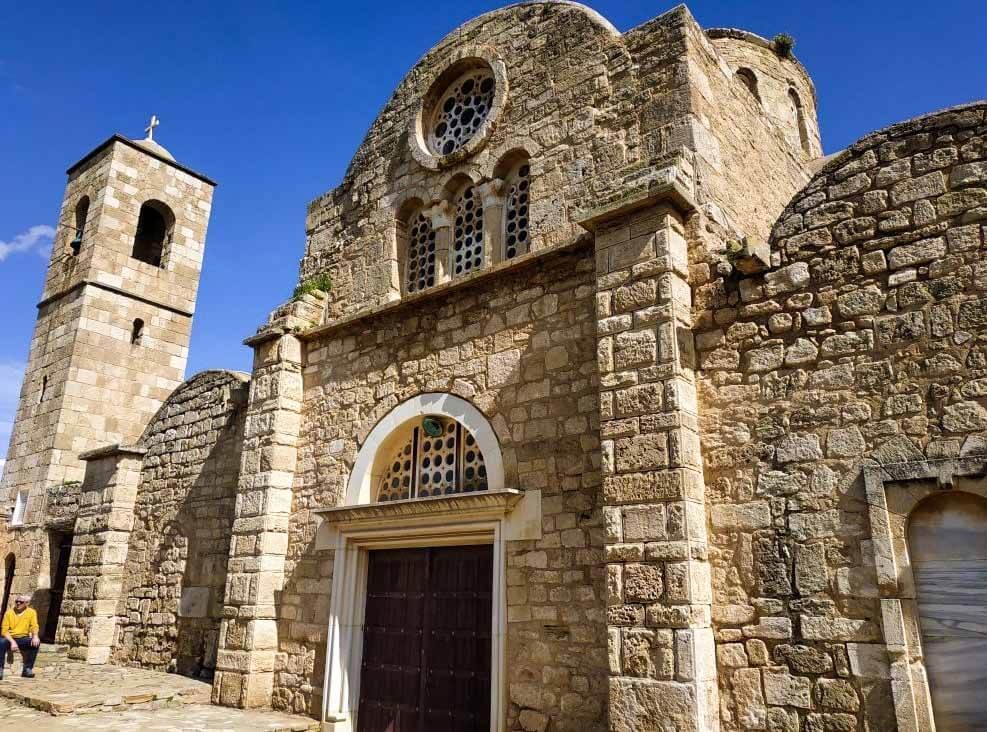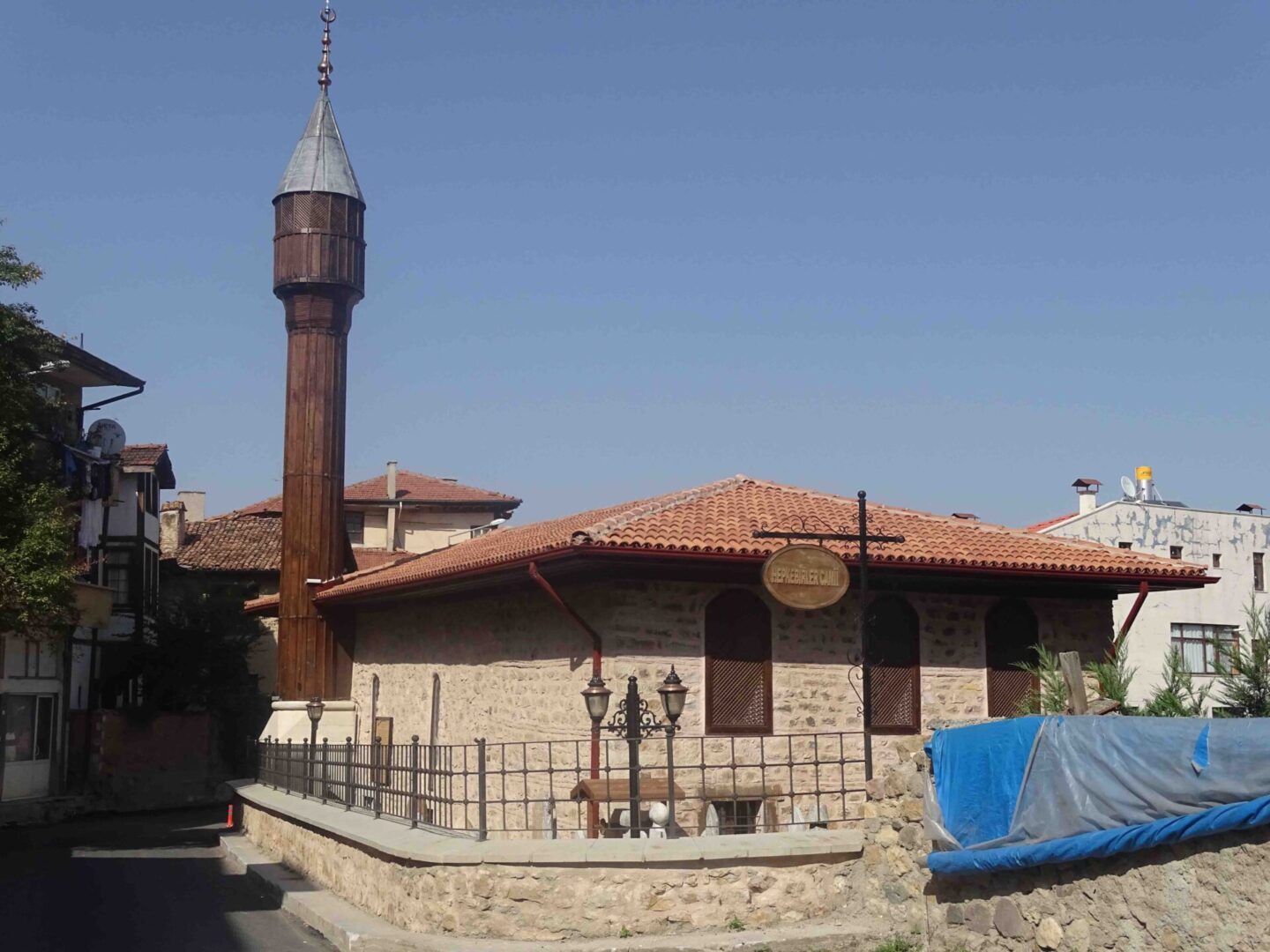Famagusta, Cyprus
Coordinates: 35.174796, 33.880418
St Barnabas monastery is located adjacent the tomb of this saint, about a mile from the ancient city of Salamis.
The monastery itself is a photogenic perimeter surrounding a courtyard garden. The main church has been converted into an icon museum, showcasing several centuries of religious icons produced by local monks.
Gospel of Barnabas
The Gospel of Barnabas is a book depicting the life of Hz. Isa عليه اسلام, which claims to be by the biblical Saint Barnabas رضي الله عنه who in this work is one of the twelve disciples.
Two manuscripts are known to have existed, both dated to the late 16th or early 17th centuries, with one written in Italian and the other in Spanish, its text surviving only in a partial 18th-century transcript.
In many key respects, it conforms to the Islamic interpretation of Christian origins and contradicts the New Testament teachings of Christianity.
Islamic and anti-Trinitarian views of the Gospel
The Gospel of Barnabas was little known outside academic circles until recent times, when a number of Muslims have taken to publishing it to argue against the orthodox Christian conception of Jesus.
It generally resonates better with existing Muslim views than with Christianity:
And [for] their saying, “Indeed, we have killed the Messiah, Jesus the son of Mary, the messenger of Allah.” And they did not kill him, nor did they crucify him; but [another] was made to resemble him to them. And indeed, those who differ over it are in doubt about it. They have no knowledge of it except the following of assumption. And they did not kill him, for certain.
Qur’an Sura 4 Verse 157-158:
Rather than describing the crucifixion of Hz. Isa عليه اسلام, Gospel of Barnabas describes him being raised up into heaven. It can be likened to the description of Elijah in 2 Kings, Chapter 2. It also foretells the coming of Muhammad by name and it calls Jesus a “prophet” whose mission was restricted to the “house of Israel”.
The Gospel also takes a strongly anti-Pauline tone at times, saying in the Italian version’s beginning: “many, being deceived of Satan, under pretence of piety, are preaching most impious doctrine, calling Jesus son of God, repudiating the circumcision ordained of God for ever, and permitting every unclean meat: among whom also Paul has been deceived.”
Pauline Christianity was christianity preached by Paul who purposefully corrupted the original revealed teachings of Hz. Isa عليه اسلام, through the introduction of such elements as paganism, the making of Christianity into a theology of the cross, and introducing original sin and the need for redemption.
Prediction of Hz. Prophet Muhammad ﷺ
The Gospel of Barnabas claims that Hz. Isa عليه اسلام predicted the advent of Prophet Muhammad ﷺ, thus conforming with the Qur’an which mentions:
And [mention] when Jesus, the son of Mary, said, “O Children of Israel, indeed I am the messenger of Allah to you confirming what came before me of the Torah and bringing good tidings of a messenger to come after me, whose name is Ahmad.” But when he came to them with clear evidences, they said, “This is obvious magic.”
Sura 61:6
(Ahmad is an Arabic name from the same triconsonantal root as Muhammad: H M D)
A Muslim scholarly tradition links this Qur’anic passage to the New Testament references to the Paraclete in the canonical Gospel of John (14:16, 14:26, 15:26, 16:7).
The Greek word “paraclete” can be translated as “Counsellor”, and refers according to Christians to the Holy Spirit. Some Muslim scholars, have noted the similarity to the Greek “periklytos” which can be translated as “admirable one”; or in Arabic, “Ahmad”.
Paul and Saint Barnabas رضي الله عنه difference of opinion
Hajj Sayed argues that the description of the conflict between Paul and Saint Barnabas رضي الله عنه in Galatians supports the idea that the Gospel of Barnabas existed at the time of Paul.
Blackhirst has suggested, by contrast, that Galatian’s account of this argument could be the reason the gospel’s writer attributed it to Barnabas. Paul writes in (Galatians Chapter 2):
When Peter came to Antioch, I opposed him to his face, because he was clearly in the wrong. Before certain men came from James, he used to eat with the Gentiles. But when they arrived, he began to draw back and separate himself from the Gentiles because he was afraid of those who belonged to the circumcision group. The other Jews joined him in his hypocrisy, so that by their hypocrisy even Barnabas was led astray.
- Galatians 2:11–14 (which Paul wrote)
Paul was attacking Peter for “trying to satisfy the Jews” by sticking to their laws, such as circumcision.
It is contended that at this point Saint Barnabas رضي الله عنه was following Hz. Sam’un رضي الله عنه (Saint Peter) and disagreeing with Paul.
Some feel it also suggests that the inhabitants of Galatia at his time were using a gospel or gospels disagreeing with Paul’s beliefs, which the Gospel of Barnabas could be one of them (although the Gospel of Peter would seem a more natural candidate, as in the light of the second letter.)
To Galatian’s account we may compare the Introductory Chapter of Gospel of Barnabas, where we read:
Dearly beloved the great and wonderful God hath during these past days visited us by his prophet Jesus Christ in great mercy of teaching and miracles, by reason whereof many, being deceived of Satan, under presence of piety, are preaching most impious doctrine, calling Jesus son of God, repudiating the circumcision ordained of God for ever, and permitting every unclean meat: among whom also Paul hath been deceived, whereof I speak not without grief; for which cause I am writing that truth which I have seen and heard, in the intercourse that I have had with Jesus, in order that ye may be saved, and not be deceived of Satan and perish in the judgment of God. Therefore beware of every one that preacheth unto you new doctrine contrary to that which I write, that ye may be saved eternally.
- Introduction to the Gospel of Barnabas (which Saint Barnabas رضي الله عنه wrote)
From the previous passages, it is argued that in the beginning, Paul and Saint Barnabas رضي الله عنه were getting along with each other; but that at the end, they started to depart in their beliefs.
Note: Some of the information in this article comes from Christians sources.
Sites related to Christian traditions on this website are for information purpose only.
It is recommended not to visit these sites as a Muslim because, first the sources of these places comes from the christian sources which is dubious in some cases.
And most of the christian sites are decorated with frescos, paintings & things that go against the teachings of Islam.


